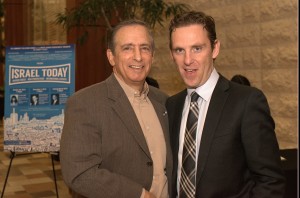On the evening of Wednesday, Dec. 3, the Community Relations Council and community partners presented the second of its Israel Today lecture series to a packed audience on the Sandler Family Campus. While additional chairs had to be set up just before the program began, it’s a shame that the entire community couldn’t have heard this very important and very disturbing message about Iran from Mark Dubowitz, executive director of the Foundation for Defense of Democracies, a Washington, D.C.-based think tank.
Dubowitz leads projects on Iran, sanctions and nonproliferation for this nonpartisan policy institute. He is a recognized expert on sanctions and has testified before Congress and advised the U.S. administration, Congress and numerous foreign governments on Iran and sanctions issues Among others, he has written for The New York Times, The Wall Street Journal, The Washington Post and Forbes, and appeared on the CBS Evening News, CNN, Fox News, NPR, PBS and the BBC.
His timely speech was filled with facts about the complicated negotiations with Iran and he terrified his audience with his clear presentation. He expressed his opinion that Iran’s nuclear development represents an existential threat to the continued existence of Israel and that Iran is the key supporter and supplier of arms to Hamas, Hezbollah and most, if not all of the terrorist organizations in the Middle East and around the world. In addition to Iran’s threat to Israel, Dubowitz clearly stated his opinion that Iran is directly or indirectly responsible for the death of more than 50% of all American soldiers killed in Iraq and Afghanistan.
He expressed his opinion that the current negotiations with Iran are going very badly for the West because the West very badly wants a negotiated deal, almost any deal, while Iran’s Supreme Leader Ali Khamenei has steadfastly refused to even discuss his long-range ballistic missiles program, reduce the number of their centrifuges or allow inspection of any of the underground facilities run by his Revolutionary Guards. He has also refused to accept intrusive U.N. or other inspections, balked at dismantling the heavy-water nuclear reactor at Arak and declined to discuss their past weaponization research that was consistently denied by Iran until its existence was finally discovered by the West.
Dubowitz’s clearly stated position on negotiations is that the party that is willing to walk away from negotiations is the party that will win these negotiations. Sadly, America seems unwilling to walk away because it has already declared that war anywhere in the Middle East is no longer an option, so talks are the only remaining choice.
Dubowitz noted that Iran responded positively to both the use of force and economic sanctions in the past, but the current U.S. administration seems to have taken both of these powerful forces off the table, which has drastically reduced its power to influence them today. Iran entered into negotiations with the West in 2003 because they saw how easily the U.S. brought down Saddam Hussein and they were afraid that George Bush would do the same to them. Their chief negotiator at that time was Hasan Rouhani, who is now Iran’s president. In speeches and a book that he wrote about his life, Rouhani boasted that by his intransigence and bluff, he was able to gain most, if not all of his negotiating goals while giving away almost nothing to the other side.
The economic sanctions imposed on Iran in 2009 brought their economy almost to a halt and was on its way to providing the nuclear reversals desired by the West when Iran agreed to another round of negotiations. Rather than maintaining the crippling economic pressure, the administration eagerly entered into negotiations and agreed to an immediate partial lifting of sanctions while talks were in progress. With both military threats and economic sanctions completely off the table, things have degenerated into a standoff while their centrifuges keep spinning and their R&D continues in an almost unrestricted and unsupervised manner. It seems to Dubowitz that President Rouhani is about to get his same positive results from 2003 again in today’s negotiations.
His final point was that all of this Iranian negativity makes the nuclear negotiations more “complex,” requiring considerable American ingenuity to explain how it is possible to verify Iranian compliance. This is why the former director of the Central Intelligence Agency and the National Security Agency, General Michael Hayden, is on record that he could not, if he were still in office, be able to verify the intelligence integrity of any final agreement produced by current negotiations. The Iranians’ refusal to countenance effective verification all by itself would, if the administration were serious, collapse these talks.
His simple and potentially effective solution is that America, rather than extending these fruitless negotiations, should encourage Iran to carry out its threat to walk away from these negotiation if they wish, but to clearly understand that this will immediately result in crippling sanctions being imposed on this terrorist state. This will force Iran to choose between its economy and its nuclear ambitions, and if this still doesn’t produce results, America’s longrange bombers and bunker-busting bombs are always available to use as a last resort.
He ended his talk by encouraging everyone to become more aware of this critical situation and then to actively contact members of Congress and advise them of our strong concerns.
To follow his suggestion, visit the web site of Dubowitz’s think tank at www.defenddemocracy.org, access one of his Washington Post articles at http://defenddemocracy.org/media-hit/senior-fellow-iran-ignores-alucrative- deal-over-its-nuclear-activities/, or read his Nov. 20 press release at http://defenddemocracy.org/media-hit/dubowitz-mark-fddexecutive- director-calls-on-congress-to-defend-sanctions/.
by Arthur Rosenfeld


